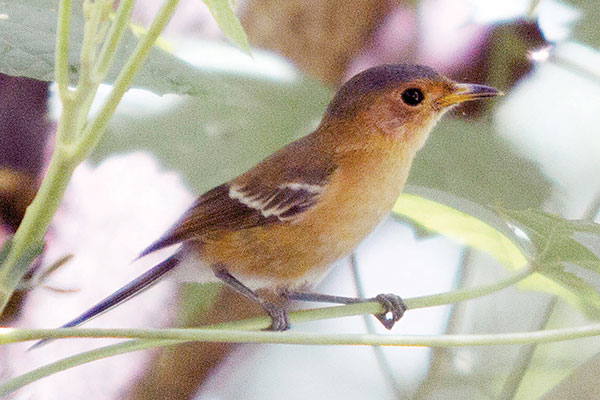Lawsuit: Military training endangers Tinian monarch
Suit seeks endangered species protection for imperiled Pacific island songbird

Tinian monarch (Monarcha takatsukasae) photographed on Tinian in July 2012 by Devon Pike. (DEVON PIKE)
WASHINGTON— The Center for Biological Diversity sued the U.S. Fish and Wildlife Service last Thursday for failing to protect the rare Tinian monarch songbird under the Endangered Species Act.
Thursday’s lawsuit, filed in the U.S. District Court in D.C., notes that this small bird lives only on Tinian, a 39-square-mile island in the western Pacific Ocean that is part of the Commonwealth of the Northern Mariana Islands. The bird is severely threatened by plans to expand military-training activities in the monarch’s last remaining forest habitat.
“This dainty little songbird needs Endangered Species Act protections immediately to have a fighting chance at survival,” said Ryan Shannon, a staff attorney at the center. “The Fish and Wildlife Service has already acknowledged the monarch’s in trouble, so we’re going to court to ensure the Trump administration doesn’t block lifesaving protections for this rare bird.”
The center petitioned for protection of the Tinian monarch in 2013 under the Endangered Species Act, which gives the Fish and Wildlife Service one year to respond. The agency has yet to do so. Even so, it identified the monarch as critically imperiled, meaning its protection should be highest priority. The Service scheduled the decision for fiscal year 2017 in its own workplan, but to date has not moved to protect the species.
The monarch, a type of flycatcher, nearly went extinct from forest clearing for agriculture and military staging during World War II. It was protected under the Endangered Species Act in 1970. Following an increase in forest cover and population size, those protections were removed in 2004. Since then the bird’s forest habitat has been slowly disappearing. Only 549 acres of native forest remain on Tinian.
“The Service has already acknowledged that the monarch is critically imperiled. It needs to stop delaying and provide this unique bird the Endangered Species Act protections it desperately needs,” said Shannon.
The monarch’s population is estimated to have declined by nearly 40 percent in recent years. Beyond the danger of increased military activities, the bird is threatened by development, agriculture, typhoons, disease, predation from rodents and the threat of invasion by exotic brown tree snakes, which have decimated native wildlife on numerous islands.
The center is a national, nonprofit conservation organization with more than 1.6 million members and online activists dedicated to the protection of endangered species and wild places. (PR)























